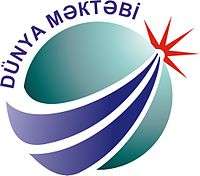Dunya School
| Dunya School | |
 | |
| Type | Private |
|---|---|
| Established | 1998 |
| Rector | Hamlet Isakhanli |
| Principal | Marufa Madatli |
| Students | 400 |
| Location | Baku, Azerbaijan |
| Campus | Urban |
| Website | www.dunya.khazar.org |
Dunya School was a part of Khazar University and was established by professor Hamlet Isaxanli (Isayev) (or Hamlet Isakhanli) in September 1998 in Baku, Azerbaijan with the objective to educate preschool and school students, individuals of 3–18 years old. Students of Dunya think critically, manage resources responsibly, communicate effectively and incorporate a multicultural and international perspective. Dunya School is an IB World School. It is accredited by the Ministry of Education of Azerbaijan and the International Baccalaureate Organization(IBO).
Dunya School has facilities including a library, a computer lab with internet access, classrooms, an art studio, a beautiful theatre with lighting and sound systems, sport facilities, a lunch room, and buses for student transportation to and from school.
The school enrolls around 400 students. Dunya is a day school, where students stay from 9 a.m. till 5 p.m.
Extracurricular activities (drama, dance and music, arts and sport, trips to interesting places, etc.) help children develop a wide worldview, work with community and grow confident. The activities of Khazar University Kung Fu Club are arranged on Monday, Wednesday and Friday.
IB Diploma Programme
Dunya School has offered the IB Diploma Programme for students ages 16 to 19 since January 2009.[1] It is one of two schools in Azerbaijan (with the International School of Azerbaijan) to offer it. The Diploma Programme is a challenging two-year programme of international education which leads to a qualification that is widely recognized by the world’s leading universities. At Dunya School the language of instruction in the IB Diploma Programme is English.[1] As an IB World School, Dunya promotes "international mindedness" and supports students to become inquirers, thinkers, communicators, risk-takers, knowledgeable, principled, caring, open-minded, well-balanced and reflective.
List of schools offering the International Baccalaureate Diploma Programme
Education policy
The learning style at the school is cooperative, friendly and student-oriented. The basic element of the learning process is formed by the students' self-evaluation — by discovering their own potential, taking on responsibilities, possessing self-confidence and, therefore, using their creativity and imagination in every aspect of life.
At Dunya School, the medium of instruction is Azerbaijani (Azeri) with English as a second language. Use of English as a language of instruction prepares children to find links between their community and the world. The students learn and use English in an interactive way, connecting their knowledge with real-life situations, using demonstration techniques. Conversational Club is held for students of all classes to motivate them to interact in English. This makes the students feel at home in an English-speaking environment.
Students learn Italian, Russian, and Arabic as well.
Art, music, drama, dance, and chess round out the educational program. Qualified professionals conduct classes in these fields that are equally important in developing a balanced character. It is Dunya's aim to educate not just the mind of the students, but to affect their behavior, attitudes and perceptions effectively, enhancing their self-awareness and self-reliance.
The classes aren't limited to the classroom walls. Art exhibitions of Dunya students are often organized at the school as well as nationally, which stimulate their creative activity. Extracurricular activities help children develop confidence in themselves and work with others. There are trips to museums, historical places, national parks, art galleries, theaters, nature, colleges and, of course, to Khazar University.
Organization
The school is divided into four departments related to stages of school education: Preschool (3–5 years old), Primary (1st - 5th grades), Basic or Middle or Lower Secondary (6th - 9th grades), and Secondary or Upper Secondary (10th - 11th grades). Parent and Teacher Association organizes and supports events and programs and serves as an important link between parents and the school. The school has an internal quality evaluation (self-evaluation) system controlled by Khazar University. The responsibility for developing in-service teacher training has also been entrusted to Khazar University School of Education. Instructors are selected for their knowledge, moral qualities, enthusiasm and care for children.
Preschool
The curriculum is attuned to cognitive, physical, social and emotional development of each child. To reach the goals of the education program the following activities are performed:
- Azerbaijani language practice
- Preparatory studies for reading and writing
- Art
- Music
- Games
- Computers
- English through games
- Free time activity
The program is improved by songs, poems, and storytelling, which encourage children's creativity and imagination.
Primary School
Dunya Primary School offers its students the academic environment, active student involvement, a balanced combination of established tradition and modern ideas and facilities. Beginning from the 3rd grade, students are taught by teachers specialized in subjects, providing them with a greater exposure to different approaches to the learning experience.
There are classrooms purposefully designed for each subject. There is no place for memorizing conceptual knowledge, neither is there any homework that doesn't serve a meaningful purpose. The intention is to teach students literacy, basic mathematics and to help them love their school through activities. Slow learners are given extra lessons.
Middle and Secondary School
According to Dunya School's approach, high school education should prepare students for an independent life and the university entrance exam. Qualified teachers support their students to help them become good citizens with critical thinking ability, who will be able to cope with modern science and technology, humanities and social studies.
References
- 1 2 "Dunya School". IB Schools. IB. Retrieved 19 May 2011.